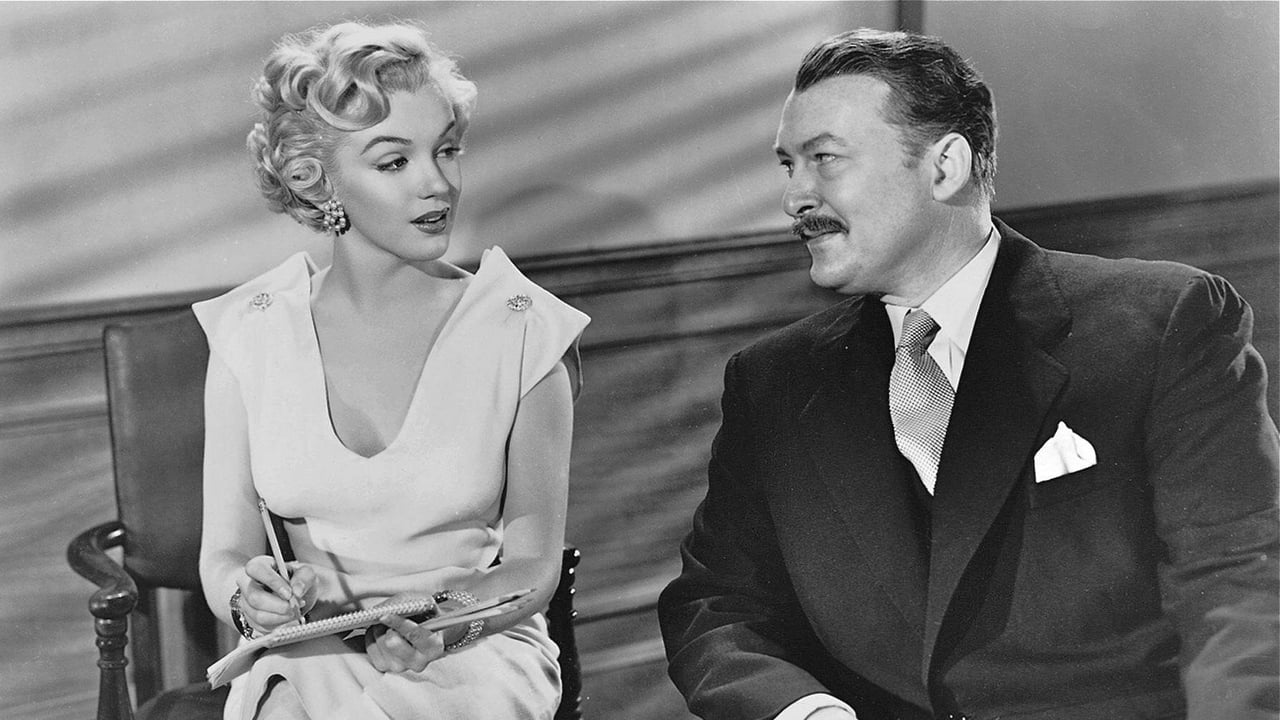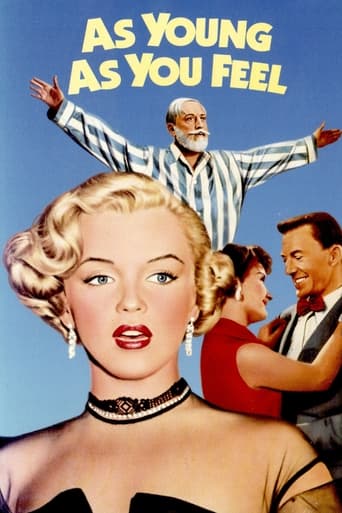Konterr
Brilliant and touching
Grimossfer
Clever and entertaining enough to recommend even to members of the 1%
InformationRap
This is one of the few movies I've ever seen where the whole audience broke into spontaneous, loud applause a third of the way in.
Phillipa
Strong acting helps the film overcome an uncertain premise and create characters that hold our attention absolutely.
JohnHowardReid
Yes, this is a bit of a treat for Marilyn Monroe's legion of fans, but be warned! Despite the fact that Marilyn and Marilyn alone graces the front cover of 20th Century Fox's DVD, her role is actually rather small. We keep waiting for her return in Act Three, but she doesn't make an appearance. Instead the camera focuses mostly on Monty Woolley, whose theatrically over-pitched, one-tone voice can become more than a little wearying. I'm surprised that director Harmon Jones made no attempts whatever to hose Woolley down a bit, but allowed him to run roughshod over all the other players. The lovely Jean Peters has a particularly thankless role. Not only is she pushed into a corner by Monty Woolley, but director Harmon Jones then allowed David Wayne to step all over her! As I said for Monroe fans, this movie is a must- have! Just don't expect too much!
edwagreen
You come away feeling great after seeing this 1951 gem. Notice that LaMar Trotti did the screenplay and co-starred Thelma Ritter and David Wayne. The three were together the following year in "With A Song in My Heart." Note how Ritter acted almost in the way she did the following year in "Heart." Notice again the references to Brooklyn in her early lines.This film is inspiring because in a comical way it covers some social issues that are pertinent today. A man, played by the wonderful Monty Woolley, protests when he is victimized by the mandatory age of retirement rule. He makes believe he is the head boss of the concern and gives a terrific speech calling for hard work, individual initiative and the end to forced retirements. The speech causes a huge success and leads to one of the boss's wives wanting to leave him to run off with Woolley. Constance Bennett is great as the woman whose marriage has lost its sparkle and husband, Albert Dekker, who is a constant worker.David Wayne and Jean Peters play the young lovers in this highly entertaining, enjoyable, feel-good movies of the early '50s. Notice a young Russ Tamblyn here as a teenage son of Dekker and Bennett's.
theowinthrop
Monty Woolley's film career has not had as much discussion as it deserves. The one time head of Yale University's Drama Department, and close personal friend (possibly lover) of Cole Porter, had been involved in Broadway for many years. He was, for example, in the original cast of the Rodgers and Hart Musical ON YOUR TOES, as the Russian Ballet impresario who sings TOO GOOD FOR THE AVERAGE MAN. He also made many film appearances in the 1930s, including the irascible, but eventually dumbfounded French judge in Mitchell Leisin's MIDNIGHT. But his fame would come when he was starred in the original production of THE MAN WHO CAME TO DINNER, and subsequently was lucky enough to repeat his performance in the film version. Other film starring parts were his as well, such as THE PIED PIPER, and his pair of films co-starring Gracie Fields, HOLY MATRIMONY and MOLLY AND ME. But more frequently he ended up in supporting parts (even in THE MAN WHO CAME TO DINNER it was Bette Davis who was given the starring position in the credits!). More typical of his later films was MISS TATLOCK'S MILLIONS, where he and Dan Tobin were two greedy uncles of "Schuyler Tatlock" (John Lund). A better (deeper) part was the Latin Scholar in THE BISHOP'S WIFE, who is going to write the greatest history of Rome since Edward Gibbon. The problem, for Woolley, was age. To an extent, in the early 1940s, he was able to still play grouchy sorts who were not too old (say about 50). But as the 1940s went forward, Woolley's age became a handicap. It was harder and harder to find material for him where he was the star.Without a doubt his last starring role was as John Hodges, the 65 year old printer who is forced by a company policy to retire while he is still mentally and physically vigorous. Few films from Hollywood had tackled the issue of aging. The best known one was Leo McCarey's MAKE WAY FOR TOMORROW, with Victor Moore and Beulah Bondi, which remains a heartbreakingly sad film. But that was made in 1935. Except for an occasional comment about aging in a film (like Berton Churchill's comment to John Carridine not to heed his white hairs if he is hesitant to challenge Churchill to a fight in STAGECOACH), most of the movies ignored aging. Even before the 1960s and President Kennedy's pushing a cult of youth and vigor, Hollywood was pretty much doing the same thing.So this is why AS YOUNG AS YOU FEEL is such an unusual film. Besides Woolley getting one of the best parts of his career, it tackled a relatively taboo subject. Why talk about the inevitable that nobody likes to think about - aging and weakening...and eventually death. It's a downer in terms of a theme for a film (as McCarey's movie had brilliantly shown). But in point of fact AS YOUNG AS YOU FEEL is the reverse side of the coin. Woolley is forced to retire from his firm, and is angry about it. Then, by chance, he is able to temporarily take over the media and town's attention when he is mistaken for the multi-millionaire (Minor Watson) who has taken over the factory that retired Wooley. Being an intelligent man, his opinions get huge publicity and sweep the nation. Woolley stresses that the chronicle age of the individual does not mean that he or she is to be put out to pasture, if he or she is capable of functioning and contributing to society. Soon Woolley finds he is in demand everywhere due to his spunky philosophy. Watson, of course, is amazed at the error, but does not stop it - he finds that it is enhancing his own public image (after all, the media and the public think Woolley is Watson). At the same time, Woolley finds the masquerade is getting out of hand in many ways. It is playing havoc with his grandson (David Wayne's) career. It is also playing havoc with the family life of the manager of the factory (Albert Dekker and his wife Constance Bennett). So caught up in the American dream of making a success of himself for his family, Dekker has distanced himself from his wife and son. Then Woolley shows up, and Bennett decides she wants to divorce her stodgy husband Decker for that lively old wire Woolley!It was a nicely written role (by Paddy Chayefsky)and Woolley did very well in it. Ironically, despite the philosophical point of view in the film, the studio system ignored the message. Woolley never had another great lead part after this film. His last memorable part was as an elderly adviser to the young Persian Monarch in the musical KISMET - not a really big part that.Ironically too, the film was one of a long string of early films that Marilyn Monroe appeared in from 1949 (from LOVE HAPPY) to 1952 (the Cary Grant - Ginger Rogers MONKEY BUSINESS). Monroe did well in most of these roles, and they gave her exposure, but even in the meatiest ones (CLASH BY NIGHT) she did not "star" in them. Yet Marilyn's name means so much to this day in film lore to the public, these early films are usually sold in "Marilyn Monroe" collections. The ever youthful, ever too fragile Marilyn remains a Hollywood icon forty - four years after her death in 1962. Monty Wooley died in 1963, but I doubt that a hundredth of the people who adore the memory of Marilyn ever think seriously about Monty and his best performances.
biker45
AS YOUNG AS YOU FEEL tries hard to be entertaining, and succeeds to a limited degree. The basic story is a social commentary on the errant ways of big business, and it remains somewhat relevant 51 years after the films release. It is classified as a comedy, but if the viewer is looking for belly laughs, there are none here. The main plot point (forced retirement of workers at age 65 by corporate policy) is belabored to the point of exhaustion. The film is dominated by Monty Wooley (he is in almost every scene), and if one is not particularly enamored of his acting style, the film quickly grows tedious. A notable highlight is the presence of a young Marilyn Monroe in the role of a secretary. The sexist treatment she receives from her boss, and her reactions to it, are the outstanding moments in the film, even though they have nothing much to do with the main story line.In summary, this is a dry, bland film that will tend to bore audiences of the present day. Older viewers (especially fans of Mr. Wooley) may find it somewhat appealing.

